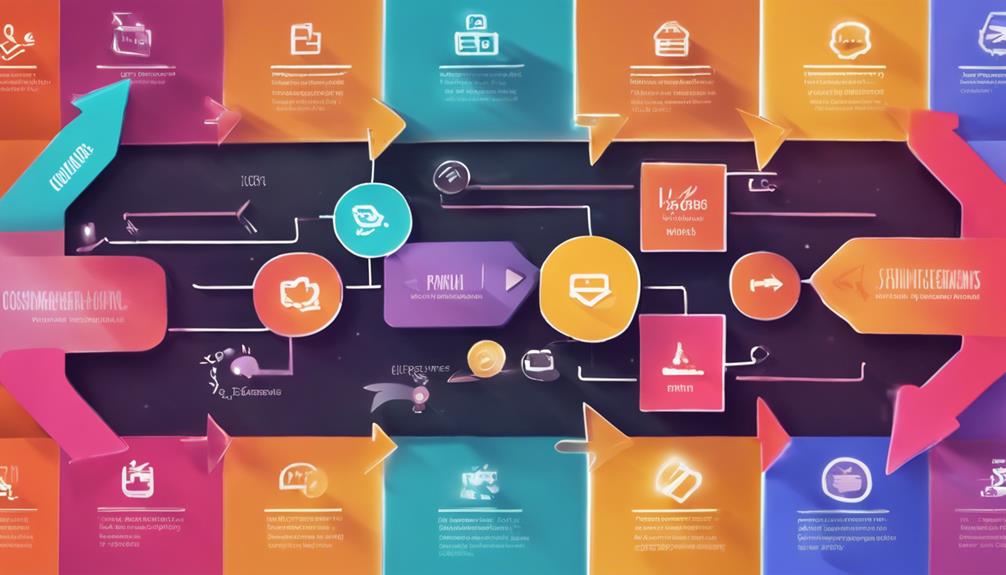I've found that effective automated marketing strategies start with setting clear goals. This guarantees focused campaigns and measurable results. Next, selecting the right AI tools can automate tasks like lead scoring and customer segmentation, driving real-time insights and predictive analytics. Customer journey mapping is vital for delivering personalized content, which can boost engagements and conversion rates greatly. Personalizing content enhances engagement by up to 48% and creates 20% more sales opportunities. Finally, continuously analyzing and optimizing campaigns maximizes conversions and increases ROI. If you want to understand how to implement these strategies for better results, keep following along.
Key Takeaways
- Define clear marketing goals to guide automated strategies and ensure targeted, data-driven campaigns.
- Utilize AI tools for lead scoring, customer segmentation, and predictive analytics to enhance engagement and conversions.
- Map the customer journey to deliver personalized content and improve customer interactions.
- Implement content personalization to boost engagement, conversion rates, and sales opportunities.
- Conduct campaign analysis and optimization through A/B testing and data-driven insights to maximize ROI and conversion rates.
Define Your Marketing Goals
Defining your marketing goals is essential because it guides every step of your automated strategy, ensuring focused and efficient campaigns that deliver measurable results.
By setting clear objectives—like lead generation, customer retention, or sales growth—you align your Marketing Automation efforts with specific, data-driven goals. This alignment allows for targeted actions and ensures your Automated Marketing Campaigns are purpose-driven.
Knowing how to Define Your Ideal Customer helps in tailoring these campaigns, driving Effective Automation Strategies. With measurable marketing goals, you can track success and optimize strategies for better outcomes.
Ultimately, aligning your marketing automation with well-defined goals guarantees that every action is focused, efficient, and impactful in achieving your desired outcomes.
Select the Right AI Tools
With well-defined marketing goals in place, selecting the right AI tools becomes the next strategic step to automate tasks and optimize your campaigns.
The right Marketing Automation tools can automate tasks like lead scoring, customer segmentation, and personalized content creation. Look for AI tools that offer advanced analytics and machine learning capabilities to drive real-time insights and predictive analytics. These tools can greatly improve customer engagement and drive conversions.
Opt for AI solutions that seamlessly integrate with your existing systems and provide scalability, flexibility, and customization options.
Map the Customer Journey

Mapping the customer journey provides invaluable insights into each step a customer takes from initial contact to conversion, enabling businesses to deliver personalized content and targeted messaging at every touchpoint. By visualizing customer interactions and identifying key touchpoints, I can tailor automated marketing strategies that truly resonate. This approach greatly boosts customer engagement and conversion rates.
Consider the benefits:
- Enhanced Customer Understanding: Gain a deep understanding of customer preferences and pain points.
- Optimized Touchpoints: Improve key touchpoints to guarantee seamless customer interactions.
- Increased Conversion Rates: Drive higher conversion rates with tailored, targeted messaging.
Personalize Content Delivery
By harnessing data-driven insights, I can deliver highly personalized content that greatly enhances engagement and conversion rates. Personalized emails alone deliver transaction rates that are 6x higher and improve click-through rates by 14%.
When brands offer personalized experiences, 80% of consumers are more likely to make a purchase. Personalizing content not only boosts customer engagement but also generates 20% more sales opportunities.
Segmented email campaigns are particularly powerful, resulting in a staggering 760% revenue increase. Overall, personalization leads to a 48% conversion rate increase and 41% higher click-through rates.
Analyze and Optimize Campaigns

Analyzing and optimizing campaigns is essential for maximizing conversion rates and ensuring the highest possible return on investment. By leveraging customer engagement metrics and thorough campaign analysis, I can derive data insights to continually refine strategies.
Here's why it matters:
- Conversion rates: Analyzing performance can boost conversion rates by 14.5%.
- A/B testing: Testing emails can increase open rates by 49%.
- ROI: Data-driven optimizations can enhance ROI by up to 30%.
Utilizing automated marketing strategies for continuous improvement is vital. Monitoring key metrics enables me to adjust and optimize campaigns effectively. A/B testing and constant refinement lead to enhanced automated marketing, yielding better results and a competitive edge.
Let's maximize our campaign's full potential by embracing data insights.
Frequently Asked Questions
What Are Marketing Automation Strategies?
Marketing automation strategies involve customer segmentation, lead nurturing, email personalization, behavioral targeting, campaign tracking, social scheduling, data analytics, content automation, workflow optimization, and retargeting ads. They streamline processes, boost productivity, and enhance personalized customer experiences across multiple channels.
What Are Some Marketing Automation Best Practices?
I prioritize email segmentation and personalized content, leverage lead scoring to target high-potential leads, and use drip campaigns aligned with the customer journey. I rely on data analysis, behavioral triggers, A/B testing, CRM integration, and social automation.
What Is the Effectiveness of Marketing Automation?
Marketing automation is like a well-oiled machine; it excels in customer segmentation, lead nurturing, workflow optimization, and conversion tracking. Email personalization, data analytics, and behavioral targeting enhance campaign management, boost performance metrics, and drive customer retention.
What Are the Strategies of Automation?
To answer the Current Question, I'd focus on email segmentation, lead scoring, content personalization, drip campaigns, social scheduling, customer journeys, dynamic content, automated workflows, behavior tracking, and multi-channel outreach to optimize and innovate your marketing efforts.
Conclusion
Wrapping up, defining goals, selecting the right AI tools, mapping the customer journey, personalizing content, and analyzing campaigns can transform your marketing strategy.
Isn't it time to leverage automation to its fullest potential? By integrating these data-driven approaches, we can achieve more targeted, efficient, and impactful results.
Don't miss out—optimize your campaigns today and watch your engagement and conversions soar!






